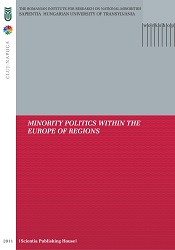“New” Nations in “Old” Europe: Ethnogenesis and Ethnopolitical Mobilisation in the Shetland and Orkney Islands of Scotland
“New” Nations in “Old” Europe: Ethnogenesis and Ethnopolitical Mobilisation in the Shetland and Orkney Islands of Scotland.
Author(s): Britt Cartrite
Subject(s): Politics / Political Sciences
Published by: Scientia Kiadó
Summary/Abstract: As many have noted, studies of ethno-political mobilisation in Western Europe draw overwhelmingly from a relatively small universe of highly visible and mobilised ethnic groups; further on, such studies focus on ethno-political mobilisation only in recent years (typically on votes for ethnic parties in national elections), failing even to capture the emergence of such movements over time. In contrast, Miroslav Hroch (1968 [2000]) sought to articulate a framework of mobilisation to account for trajectories of mobilisation over time among some of Europe’s most mobilised groups. Cartrite (2003), building on this framework, examined all fifteen linguistically distinct groups in France, Spain, and the United Kingdom. Both studies focused on linguistically distinct groups, again raising the possibility of case selection bias. Further, much of the analysis focuses on later phases of ethno-political mobilisation, particularly once interest groups and political parties emerge, although both studies clearly demonstrate the importance of early mob ilisation structures for subsequent activism. This study focuses on the dynamics underlying what might be termed “ethnogenesis”: initial efforts to articulate a distinct group identity that may facilitate subsequent ethno-political mobilisation. Focusing on the Shetland and Orkney Islands of Scotland, this study assesses the current nascent state of ethno-political mobilisation with a particular focus on the mobilisation of local dialects as a salient marker of ethnic identity. Both island groups in recent years have had activists focusing on the standardisation and teaching of the local dialects of Scots, in addition to other symbols such as flags, to “preserve and protect” the local identity. And in both cases, individuals oppose these efforts as indicative of initial efforts at nationalist agitation. This study finds that despite the lack of a distinct language and history of political activism, models of ethnopolitical mobilisation developed to explain that more advanced cases apply well to these groups.
Book: MINORITY POLITICS WITHIN THE EUROPE OF REGIONS
- Page Range: 21-35
- Page Count: 15
- Publication Year: 2011
- Language: English
- Content File-PDF

